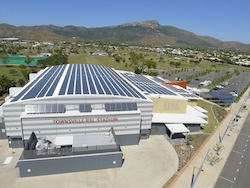Hyrax Energy and the Wisconsin Alumni Research Foundation (WARF) have signed a licensing agreement for a renewable chemical and biofuel production method. The chemical process uses ionic liquids to break down cellulosic or non-food plant-based biomass without using enzymes or the need for pretreatment steps. The technology was developed with the aid of University of Wisconsin-Madison biochemistry professor and Hyrax founder, Ron Raines.
 The company’s process creates fermentable sugars, which can be converted into a variety of chemicals, including fuels and plastics. Hyrax says the process developed avoids the need for costly pretreatment efforts typically used to overcome key problems with biomass including its water-insolubility and resistance to molecular deconstruction. The technology avoids these problems by employing ionic liquids to dissolve raw biomass from the beginning.
The company’s process creates fermentable sugars, which can be converted into a variety of chemicals, including fuels and plastics. Hyrax says the process developed avoids the need for costly pretreatment efforts typically used to overcome key problems with biomass including its water-insolubility and resistance to molecular deconstruction. The technology avoids these problems by employing ionic liquids to dissolve raw biomass from the beginning.
“Doing the entire conversion process in ionic liquids eliminates enzymes, pretreatment steps and harsh energy inputs and leads to a dramatic reduction in process complexity and capital intensity,” said Raines. Coupled with its scientific significance, the licensing of the new technology marks a major step toward commercializing this approach to biofuel production on an industrial scale.”
Raines said the paten-pending technology has been validated by third parties. He also said that the help of the Great Lakes Bioenergy Research Center (GLBRC) and WARF Accelerator Program helped to fund development of the technology and provide the intellectual property protection necessary to support the process of commercialization. Hyrax is the first company that is part of GLBRC to begin the process of commercialization and also won the 2012 Clean Energy Challenge sponsored by the Clean Energy Trust.









